As I passed the little river on my way to work on Monday, I noticed that the heron had a feather out of place.
I told him so.
"Did you know you have a feather out of place?" I asked.
"SHUT UP!" shouted the heron. "YOU'RE SCARING THE FISH!"
"I didn't yell," I said, indignantly. "You did!"
"You started it, stupid," said the heron. "Even an idiot knows that breakfast messes up your feathers. What would be the point of tidying up beforehand?"
"That's like saying there's no point in brushing my hair in the morning because a normal day will just mess it up," I argued.
"Seems to work for you!" said the heron.
I got really upset.
"I BEG YOUR PARDON!" I shouted. "AT LEAST MY HEAD DOESN'T EXPLODE!"
"NOBODY WOULD NOTICE IF IT DID!" yelled the heron.
He stomped off. 
Suddenly I felt ashamed. What was I doing, arguing with a bird? What was wrong with me? And why was I losing?
"There was a fish RIGHT THERE, and I MISSED it because of you," grumbled the heron. "That was my breakfast!"
I made an effort to patch things up.
"I think it went over by that rock," I called.
"Oh, rubbish!" said the heron. "What do you know?" He paused. "Round here, you say? I can't see anything."
"I'm sure I saw something move," I said.
The heron was doubtful. "What would you know about fishing?" he asked.
"Not much," I admitted. "I'm just trying to help."
"Well, I don't need your - OOH!"
"What?" I asked.
"GOTCHA!" 
"What is it?" I asked.
"Er ... none of your business," said the heron.
"Well, aren't you even going to thank me?" I asked.
"What for?" said the heron, ungratefully. "You scared it off in the first place." 
I got upset again. I just couldn't help myself.
"I HOPE IT'S REVOLTING!" I shouted after him.
Things never turn out well when bad hair days collide.
Wednesday, May 31, 2006
Breakfast
Posted by
Badaunt
at
5:29 pm
5
comments
![]()
Labels: Birds
Tuesday, May 30, 2006
Plagiarism
On Friday I handed back some homework. It was fairly easy homework, for one of the higher level classes. ('Higher' being relative, of course.)
While I was marking this homework, I realized I had not given this class the photocopied instructions regarding homework, at the beginning of semester. This includes information like:
Please do not copy. Use your own words. Copied homework receives an automatic 0.
Do not write your homework on the back of a ripped off piece of advertising flyer, or on toilet paper.
And so on. (The toilet paper bit isn't actually there, but should be.) It's all pretty basic stuff, but you'd be amazed at what gets handed in when I do not give this information.
Even without the handout, though, this class had done pretty well, aside from a few who had written in their notebook and then ripped out the page (badly) and given it to me with their class notes on the back. But there were two that were almost identical. They had identical mistakes, and one had extra, added mistakes, which made me fairly sure that was the copied one.
I wasn't sure how to handle this. I hadn't given them the information handout about homework, but I did not want to give any points to the plagiariser. I still hadn't decided what to do when class started.
I handed back the homework, holding back the two offending papers. When I got to those, I paused. Then I announced,
"I have a problem with the last two."
I said the names of the two offenders, and they sat up straight.
"They are the same," I said, waving the papers. "I don't know who did the work. Who should I give the points to, do you think?"
Everybody (except the offenders) laughed and laughed and laughed. There is apparently nothing funnier than when one of their mates gets caught cheating.
"Should I divide the points fifty-fifty?" I continued. "Half each? Did you work together?" (Sixty is a passing grade. Fifty-fifty means they both fail.)
"NO!" they both shouted. Then they both added, loudly, "MINE IS ORIGINAL!"
The class rocked with laughter. The two offenders looked really upset. But one was more upset than the other, and shot up indignantly, glaring at his friend.
"SENSEI!" he shouted. "MINE IS THE ORIGINAL! TRULY! BELIEVE ME!"
The other one retorted, half-heartedly,
"No, MINE is original - "
"IT IS NOT!" shouted the standing student. He was almost dancing with hysteria. "BELIEVE ME, SENSEI! BELIEVE ME"
The class roared.
"TRULY!" shouted the standing student. "It is MY homework. HE COPIED IT." He pointed accusingly at his friend, who waved his hand in defeat.
"All right... it's his homework," he finally admitted.
Some of the other students were almost weeping with laughter by this point. (Was it really so funny?) I waited for them all to calm down.
"Do you want to do it properly?" I asked the offender. "You won't get so many points, but it will be better than nothing."
"Really?" he asked, hopefully. You'd think I'd just told him he wasn't going to be executed after all.
"Yes, really," I said. "And also, read this. VERY CAREFULLY."
I waved the homework handout, which I'd finally got around to copying. Then I distributed it to the whole class.
The plagiarizer wasn't the only one to read it VERY CAREFULLY.
Posted by
Badaunt
at
6:52 am
3
comments
![]()
Sunday, May 28, 2006
Institutionalized
I was sent a review copy of the book Institutionalized after I commented on a review of it on the Auspicious Dragon bookblog. I have never been sent a review copy of a book before, and I'm not sure how useful my review will be. However, I will do my best. (Incidentally, their site seems to be down, but you can find it on Amazon.
I am late with this review, because I read the book just before semester started, which was at least 7 weeks ago, and then got caught up with the madness of work and never had time to sit down and think about what to write. I did take notes. I wonder what I did with them? (I do not write on books, and now I'm thinking that perhaps I should have.)
Institutionalized is set in the world of corporate America, a world with which I am not familiar at all. For this reason I was a little lost some of the time, but that did not get in the way of the story. From all I have seen and read, the American corporate world really is as full of absurdity as the novel suggests. And the novel is delightfully absurd. It is office politics taken to insane extremes, and I’m sure people in corporate environments will find it terrifyingly and hilariously relevant. As a Kiwi in Japan, having no contact with the American corporate world at all, I found it funny but was not able to judge how accurate it was. I suspect it is, though.
The main problem I had, then, was with the lack of context, which was, mostly, MY lack of context, not the book's. The cover offers the following clue:
From a renegade team of international corporate surveillance experts comes a behind-the-scenes, riveting tale of one of America's biggest corporations struggling to bring best practice to life in a cruelly competitive businessworld.
This helped me, but not much. When I started reading I wanted to know who the surveillance experts were and for whom they were working, and why, but that information was not forthcoming. I found this confusing, because I did not realize that the information was missing intentionally, as a part of the plot. I thought I’d just missed it because I didn’t understand what was going on, or have a clear idea of the context of the story. It wasn’t until I got to the end and all was revealed that I realized I was not supposed to know at the beginning, and it wasn’t just my cluelessness. I would understand the whole story better if I read it again, and I have to confess I was lost at first.
It didn't matter all that much, really. I got caught up in the story anyway. It is a fun read. I found it difficult to keep the characters sorted in my head for the first half of the book, mostly because of my confusion caused by the lack of context and because of the unfamiliar (to me) job titles, which I'm sure mean something, but not being in that particular world I'm not sure what. What does a Chief Operating Officer do, for example? An Executive Vice President? I'm sure these are meaningful labels, but as a clueless reader I found it hard to keep the characters separate, much as I do when I read business reports or press releases in the newspaper. What are these people supposed to be DOING? It is as hard to tell, because most of them seem to spend most of their time plotting against each other in various hilarious ways, or spouting nonsense.
But that is, of course, the whole point of the story.
My original comment on the Auspicious Dragon bookblog was concerning the accents of the Oriental characters in the book, who are Chinese but who, it was pointed out in the review, spoke with Japanese accents. From the examples quoted of this, even as Japanese accents they were not very convincing, and I explained why in my comment so will not go into that here. I had hoped that I would be able to offer suggestions about how better to portray a Chinese accent, but I can't. I have Chinese students, but they are not fluent speakers and sometimes they have picked up pronunciation problems from their Japanese teachers of English, which complicates things. Also, I just don’t have enough experience.
My opinion is that the writers need to either consult an expert (which I am not) or listen extensively to Chinese speakers of English as a foreign language to find out exactly what they do sound like. Simply switching ls and rs does not work.
But that is a minor flaw.
The book is funny. Not laugh-out-loud-funny, at least not for me, but more satirical-grin-funny. It covers ten weeks in a plastics company called Institutionalized Industries. There is a megalomaniacal CEO who identifies with Napoleon, a bunch of insanely ambitious people working under him who constantly plot and plan to bring each other down, and massive doses of corporate-speak which are almost but not quite unbelievable. There were aspects of that which reminded me more than a little of Japanese academia - the politicking and backstabbing, the power games, the emphasis on looking good and sounding good with no real substance under the words and images (you should see the promotional materials at the places I work!), and that made me wonder how realistic it is. After all, academia, in Japan at least, does not have to answer to shareholders, but corporations do. Can the people at the top of big corporations really be that incompetent? Can certifiable lunatics even get to the top like that?
The frightening thing is that maybe they can. Maybe the most effective top brass are the ones who interfere the least, and if they are constantly clawing past and over each other and producing insane memos and getting caught up in New Age-type nonsense about 're-empowering and re-involving' the corporate culture, maybe it is a GOOD thing, because keeps them occupied while the people who do the actual work to get their jobs done. And this book lampoons them very effectively.
In the end there was really only one major character it was possible to like. Halfway through the book, when I was still fairly confused, I didn’t think I would buy a sequel. I didn’t feel involved enough. But in the end I discovered I wanted to know what happened to him next, and how he would navigate the Machiavellian world he (almost accidentally) inhabits.
There will be a sequel, apparently. I will buy it.
Posted by
Badaunt
at
8:47 pm
2
comments
![]()
Important fact to remember
Not being able to hear yourself fart while listening to something on your iPod does NOT mean that others cannot hear it either.
Posted by
Badaunt
at
12:51 pm
3
comments
![]()
Saturday, May 27, 2006
Teacherly authority
Today I had the lovely but depressing class who had so much trouble with their very basic homework last week, and one of the students gave a demonstration of how cooperative and dedicated this class is.
It went like this.
In that particular classroom there is no blackboard. It is in a new building, and they have blackboards and whiteboards in the better rooms, but I have been given what they have called, mysteriously, a Practice Room, which is oddly elongated and contains only a whiteboard. This whiteboard is far too small for the length of the room - the students at the back cannot see it very well - but still, I prefer it to the blackboards. I do not end up with so much yellow chalk dust to clean out of my nostrils at the end of the day. (How come the white chalk always runs out but there is always a huge quantity of yellow chalk?)
The biggest problem with the whiteboards is that nobody ever seems to replace the markers, so that you end up with half a dozen markers and none of them work properly. The supply office is on the ground floor, and while I try to remember to carry good markers with me, this doesn't always work. I use the markers in one room, and forget to put them back in my bag, so the next time I'm in a classroom with a whiteboard I am again markerless, and have to rush downstairs.
Today there were several markers but the only one that worked was a red one, so I used that. But then it started to fade badly as well, and although I had already rooted around my bag looking for a good pen I decided to give it one more try, and experienced a minor miracle. There was a blue marker right at the bottom of my bag.
This meant that what I had written, which was a very simple list of ways to respond to things people say, switched somewhere in the middle from faded red to bright blue. No problem, right? It was all legible.
As the students were copying what I'd written I wandered around the classroom, as I tend to do, and looking over shoulders noticed that one of the students, who was writing very carefully indeed, had copied not only the words but the colours. He had written the first part in red, and then switched to blue halfway through the word Really?. Re was red, and ally? was blue, just like it was on the board.
I nearly said something, but decided not to. What was the point? It would just embarrass him. But I thought about it as I continued my perambulations around the classroom. The student obviously thought my switch of colour had meaning, but what did he think it meant? Hadn't he seen me frantically searching through my bag looking for a new pen? Hadn't he noticed that the red pen had faded so much you could barely see it? Did he think I was searching for a blue pen especially so I could switch colours? What POSSIBLE REASON could he think I had for switching colours in the middle of a word?
Then I started thinking about what OTHER meaningless things I do in the classroom that the students might think are significant, and I began to worry. My god, is every single thing I do scrutinized for significance that the students are afraid of missing? I already know that my awful stick figure pictures of various things will be copied, with painful, embarrassing accuracy, by these students, but it hadn't occurred to me that the students were copying them so carefully because they considered them meaningful. I thought they were copying the pictures to laugh at, later. Do they think they will have to reproduce them in a test at the end of semester? Do they practice drawing like I do, do you think? And if the word really turns up in a test, will that student write it in red and blue?
To be taken so very seriously is frightening. If I think about it too much I will be paralyzed.
---------
After my last class today, I managed to get away a little sooner than usual, and went along the corridor beside some classrooms on my way out. The sports classes are in the evenings. These students take their sports very seriously, but their studies not at all. Some of the sumo wrestlers had arrived for the English class, I noticed. Seven or eight huge blokes were in one classroom, sprawled over desks that looked suddenly midget-sized. They were sleeping deeply, and I had no doubt they would remain comatose for most of the class. I think what they do is practice hard all day, eat a huge dinner, and then arrive at their evening classes (starting at 6.10) just in time for a nice long nap. These guys barely speak in grunts even in Japanese. Trying to teach them English is famously hellish, and I'm very glad I don't have to.
As I carried on along the corridor a bunch of four more sumo wrestlers approached me from the stairwell at the other end, and as they got closer I started to feel nervous. They were very tall and built like brick shithouses. Their faces did not encourage friendliness. I think they are taught to look dumb and scary as part of their training.
I walked a little slower. They were using up all the corridor and making me feel like one of my own stick figures. I was too tired for confrontation, and wondered whether to chicken out completely and duck into an empty classroom. But then I thought, Hey, wait a minute, I'm a TEACHER! I have AUTHORITY! I didn't feel very authoritative, I must admit, but I also thought, And what if I end up having to teach them NEXT year and they already know I'm scared of them?
So instead of running away, as they neared I looked the biggest one in the eye, smiled, and said cheerily, in English,
"Hello! How are you?"
The effect was electrifying. Two of them shot past me, skidded to a halt at a safe distance, and turned to see what the alien would do next. The one I'd addressed dropped his umbrella and bent over to pick it up. The fourth stood there like a big ball of putty and stared speechlessly with his mouth open. I raised my eyebrows and asked, "Fine?" After a moment he grinned, nodded, and looked goofily pleased. He'd understood!
The one who'd dropped his umbrella fumbled and dropped it again several times. Bent over like that his bum looked like a mountain. I've never been that close to a sumo bum before, and even though it was clothed it was still intimidatingly huge. I decided I'd asserted my teacherly authority enough for one day.
"See you later!" I said, and walked on. I turned as I got to the stairwell, and they were all staring after me. I waved. They waved back uncertainly.
As I went down the stairs I discovered I was suddenly feeling much taller.
Posted by
Badaunt
at
1:36 am
6
comments
![]()
Wednesday, May 24, 2006
Manners
Today before work I went down to the little river, and met a heron. I was pretty sure it was not the usual heron, and I wondered who it was.
"Hello," I said. "Are you a baby? I don't remember seeing - "
"Me, a baby?" asked the heron. "How insulting! I'm all grown up!"
"Oh, sorry," I said. "I was just wondering if - "
"Wondering what?" asked the heron. "What business is it of yours who I am?" 
"Er, um," I said. "Let me try again. Hello. My name's Bad Aunt. Nice to - "
"Ooh, Bad Aunt! I've heard about you!" said the heron. "You're a teacher, aren't you? I've been having lessons recently. I bet I can fly better than you."
"Er... probably," I said. "I'm not much good at fl - ."
"That just proves it then," said the heron. "Those who can't do, teach."
"I beg your pardon?" I said. "That's not true! I just don't teach fl - "
"Hey, you can check something for me, since you've got a camera," said the heron.
"What?" I asked. I was getting a little irritated. Would this bird ever let me finish a sentence?
"I've learned that it is very important to point your toes when you fly. I'm sure YOU can't fly well, but at least you can check if I'm doing it right."
"Well, at least you could say plea - " I began.
"Take photos," said the heron. "Stick them on your blog and I'll check them out tonight. I've just remembered an appointment, and I can't hang around."
"Hey, wait a minute!" I said. "What do you mean, stick them on - "
But the heron took off without even saying goodbye.
I took pictures anyway, and as far as I could see the heron was pointing its toes perfectly. Actually (ARE YOU READING THIS, BIRD?), its flying was a lot better than its manners.



Posted by
Badaunt
at
9:17 pm
7
comments
![]()
Labels: Birds
Tuesday, May 23, 2006
Sweet spot
Today I did dictation in all my classes, so my voice is a little tired. I decided on dictation because it works so well to get students' attention, and when it is rainy and humid like today they tend to fall asleep. So would I, if I were not standing up.
Trying to find something suitable to dictate to them took me several hours last night. I was not feeling inspired, otherwise I might have written something myself. I wanted to use something that was not 'dumb,' something that they could understand at their level, but in which the meaning was not also dumbed down so much they'd feel like they were being treated like idiots.
Thinking about this made me remember some stories I'd come across before, that were very, very short, and which were sometimes funny and could be taken as jokes, but which generally had another level of meaning as well, or at least could lead to discussions about more serious topics. They were from the Middle East somewhere, I remembered that much, and and they all involved a particular character. But I couldn't remember the character's name. The same character turns up in all these stories, sometimes as a fool, sometimes as a wise man or a judge, usually very poor, and always just a little bit tricky or absurd.
It took a few hours, but I finally found my little hero on the Internet. (Bless Google! It's amazing what you can find using just a vague memory of something encountered years ago and almost no specific information.) I found him here, and once I'd found his name I also found them in numerous other places tonight. (A search using Hodja will get you more hits, since that part of his name is usually spelt the same way, whereas there are variations in the spelling of Nasreddin.) I was too tired to hunt further last night, but the ones I found were enough, and I used the story of Nasreddin the Ferry Man for the dictation today. It was just the right length. It is very short, but the dictation activity took almost an hour, because I read each line of the story at story-telling speed, not at slowed-down-for-language-learners speed. This meant it was harder for the students to get it, so I had to repeat each part many times.
I began by introducing the background of the story. I explained what I knew about the character, and that this was just one of many stories about him. I also explained that the stories were often funny on the surface but also had other layers of meaning. I said I wasn't quite sure what the deeper meaning of the story I was about to tell them would be for them, but I was sure they'd think of something. (My little bit of subversion for the day, as you'll see if you read the story.)
I read the story through once first, to give them a general idea of what to expect, and then started the dictation.
The students had a terrible time with the last line. As I was reading the story, I was walking around the classroom watching what students wrote so I would know when to move onto the next line. I read each line as often as they needed, but never slowed down too much - I wanted them to be noticing elisions and contractions and so on and to get some idea of how the written and spoken word correspond. I was dictating it as a storyteller, not as a teacher - I wanted to keep all the expression you would normally put into reading a story to someone, so they would get information from the tone and expression and so on. (This was also more fun for me.) I kept each phrase or sentence intact, not breaking it up into individual words, and repeated those phrases or sentences as often as it took for them to get it right, or almost right.
But no matter how many times I repeated that last, three word sentence, or how clearly, nobody got it right.
"WE ARE SSSSINKING!" I repeated desperately, and my students nodded to themselves, examining what they had written:
We are thinking.
Of course this meant that the story made no sense at all (and reminded me irresistibly of the gulls' awful pun in The Sinking Problem). That the story didn't make sense didn't seem to bother them, though. I'm afraid they expect English to not make sense.
Eventually I gave up, and got them writing the story on the board from their notes. Then I went over it, line by line, repeating what I said and then what they wrote so they could decide if it was the same or different. They listened intently, and sometimes they knew there was a difference and could pin it down, and sometimes they knew there was a difference but couldn't pin it down, and sometimes they thought it was the same when it wasn't. And now and again they got it exactly right the first time.
When I read the last line correctly and then incorrectly, one after another, they got it, finally, so I was able to change thinking to sinking on the board. Then I explained what 'sinking' meant (by means of a badly drawn picture of a sinking boat, complete with little stick figures waving their arms), and watched them as they reread the story and put it all together. I could see their expressions changing when they started to understand the meaning of the story as a whole. That was a good moment.
Then I read the story to them again, and despite all those repetitions (and repetitions and repetitions) we'd already had, they all listened VERY CAREFULLY. I put lots of expression into it, using different 'voices' for the pompous professor's questions and the idiot (or maybe not) ferryman's answers. The satisfied faces at the end, when the students realized they'd understood the whole thing read at normal speed, made the damage to my vocal chords all worthwhile.
To make it even more worthwhile, one of the (usually) too-cool-to-study bad guys hovered around after the last class, pretending to be just a bit slow packing up but really to tell me, casually (but a bit embarrassed at himself), that today's lesson had been a hard one. He shook his head and sighed to demonstrate how tired he was from so much concentrating. Yes, it was metcha difficult, he said - but also, he conceded (unable to quite conceal his surprise), pretty interesting, really.
"They are good stories," I said, hiding my own surprise that he would even talk to me voluntarily. "I like them, too."
I knew that wasn't exactly what he meant, but he nodded wisely, said goodbye, and sauntered off, bad-boy pride intact.
I stood there for a moment, savouring the feeling. It's not often that I hit the sweet spot during a nasty bout of mid-semester blues AND on a rainy day!
Now all I have to do is think of something metcha difficult and pretty interesting to follow it up with for their next class, next week.
Posted by
Badaunt
at
11:56 pm
3
comments
![]()
Sunday, May 21, 2006
Frustration
I wasted a beautiful spring day yesterday by spending it inside, marking homework. It was depressing. One of my classes this year is of first year students, whom I expected to be low level. They are the lowest of eight classes in a department not known for the brilliance of its students. I have been going very, very slowly, and ignoring the syllabus. If I tried to follow the syllabus they would be lost, and would stop cooperating. But unlike most low level classes, their problem is not one of attitude. It is often true that low level students are low level because they do not know how to concentrate, or have given up, and so spend class time doing anything except paying attention.
But this class is not like that. They seem to have decided to trust me, and are respectful and attentive. They want to learn. They try very, very hard, and I reward them by being very, very patient and trying to show them that English is not impossible. I can be very patient. I know how hard it is to learn a language.
The problem, though, is that they lack even the most basic skills in English. They have the sort of knowledge about English that makes them worse than beginners. They have NEGATIVE ability in English. They have learned so much wrongly that the problem is not how to teach them, but how to UNteach them everything they have learned wrongly. I wish I could tell them to forget everything their other teachers have taught them, but that would be like telling them to disrespect their other teachers. I don't think that would work, particularly coming from a foreigner.
In the homework I was marking yesterday, most of the students demonstrated that they do not understand the present simple tense. I had given them something from the workbook (the one I copied twice by mistake) which I thought at the time might be insultingly easy for them, but I was wrong, and it has reminded me that I cannot go too slowly for this class. They are completely baffled by English. They appear to use what they have learned almost randomly, as if they do not expect English to be logical or to have meaning. One of the exercises in the workbook was one in which students were supposed to write short answers to questions. Here are some examples of answers students gave:
Q: Are you from Osaka?
A: No, I don't.
Q: Is she a teacher?
A: No, she are.
About 70% of the answers were like this.
In another exercise students were supposed to fill in blanks with words provided. One sentence went like this:
Nice to ______ you, Tania.
The words they had to choose from were:
over, think, meet, too, that, am, is
When students choose think as the answer, you start to wonder if they actually understand what the words mean. This is BASIC STUFF. All these students have had English lessons at junior high school and high school, and this is their seventh year of learning English. What on earth were their teachers doing in the last six years? The other thing I wonder, when I get answers like this, is whether they were given a lot of trick questions in English exams. Nice to meet you is a formulaic expression that turns up in just about every English textbook in existence. How could they not know it? They must be choosing answers at random, because when they've given the logical answer before they've been wrong, tricked by something obscure chosen for an exam.
I can only imagine that their previous teachers must have been following the syllabus, whether or not the students understood what they had (supposedly) learned before. This makes me angry, not at the students, but at their teachers and at the system the teachers are following. What did they think they were DOING? What possible good did they think they were achieving?
And why is it continuing, even at university? When a student whose English is at this level approaches you after class and wants to know (in Japanese, of course) if you can help with some homework from another English class, and then shows you a passage from Ulysses (unabridged), which he is supposed to translate into Japanese, it makes you want to go out and strangle the criminal who is destroying any chance of that student ever getting any pleasure from learning.
But the Japanese professors who teach English will not teach basic English, at least not at this university. They are ACADEMICS, and they teach their idea of what 'academic English' is. They look down on the foreign teachers, who teach communication. We are not real academics. We are not even allowed to teach grammar classes. Grammar is an academic subject, so the Japanese professors teach that. We get the communicative classes, which they refuse to teach because communication is not 'academic.' (And besides, most of the professors are incapable of communicating in English.)
I spend a lot of time trying to teach grammar in a way that does not look like I am teaching grammar, which could get me into trouble. But then there is an additional problem of interference from their 'real' grammar classes, where the students are learning obscure 'academic' grammar constructions they do not know the meaning of, do not know how to use, and which are not taught in context. Students sometimes insert these at random into things they write or say in my classes. I am happy that they are trying to use what they learn, but unfortunately the grammar they are taught in their other classes is often literary, or obsolete. I cannot tell them to forget these things, because they need them to pass exams. Mine is only one of the three or four English classes they have a week. I am fighting an uphill battle.
The system is mad. Here we have, at this university, 60 or 70 fully qualified language teachers, and we are not trusted to teach all aspects of English because we are foreign. We are only given the communicative classes because they are second-rate (like us) and 'not academic.' We are only good for being native models of the language. We are not trusted to actually know about the language we are teaching, only to provide an example of what native English speakers sound like. We are not allowed to teach English as a whole language. We are only supposed to teach 'how to have a conversation.'
This problem is not confined to English. Last year, in one of my second year classes, a question came up in the textbook about how many languages you could count to ten in. I told one group I could count to ten in French - I remembered from my one year of French at high school. In fact, I told them confidently, I could count to TWENTY - but then I discovered that I couldn't. I had forgotten the French word for eleven. I knew one of the students was also learning French, so I asked him to remind me.
He looked embarrassed.
"We haven't done numbers yet," he told me.
He was in his second year of French and HADN'T LEARNED NUMBERS YET.
I asked him what they were doing in class, and he said they were translating paragraphs from literary texts. I asked if his professor spoke French, and he didn't know. He had yet to hear a word of French spoken. His professor was too busy being 'academic' and teaching 'academic' French, I suppose. I shouldn't have been surprised. After all, his teacher was a PROFESSOR and professors teach ACADEMIC, INTELLECTUAL things, not something as low status as actual language IN A LANGUAGE CLASS. And there are no native French-speaking teachers at that university, so the poor kid is not likely to ever learn numbers.
I should not think about these things. It makes me too angry. The students are cheated, and their natural love of learning is deliberately sabotaged. Many of the students want to learn, and they are instead demoralized into believing that foreign languages are difficult for Japanese people. I was actually TOLD this by a Japanese professor, one of the two (out of about 30) Japanese English professors who actually speaks to us part-time foreign teachers.
And that is why you hear so much cynicism in the foreign teachers' room, and why I am frequently frustrated (we all are), and why I sometimes feel such massive scorn for the Japanese professors that I have a hard time smiling politely at them when I see them, rather than sneering. When I smile and greet them - in Japanese - most of them do not respond anyway, or respond with a curt nod. I suppose this is because I am not a real academic and not worth acknowledging. I smile and greet them cheerfully anyway, no matter what. I am doing my bit for international relations. (Also, I can see it makes them feel uncomfortable.)
In case you haven't noticed yet, I am still feeling frustrated and depressed by my absurd job. But I will not mark any more homework today. That was enough for one weekend. The weather is beautiful, the scent of honeysuckle is drifting in through the window, and The Man and I are going for a bicycle ride to do some shopping. The yellow sand problem has gone (for the year, I hope) and maybe some sunshine and fresh air will make me feel better.
Posted by
Badaunt
at
12:32 pm
11
comments
![]()
Wednesday, May 17, 2006
Motherhood
It rained today, so I used the walkway between buildings when I went to class. The walkway goes from the second floor of the building with the teachers' room in it to the second floor of the building with my classroom in it. I was almost across when I heard a disgruntled voice:
"Do you really have to stamp your feet like that?"
I stopped. "I beg your pardon?" I asked.
"Can't you walk a little more quietly?" said the voice. "You'll wake the babies."
I looked up. Then I looked down. And then I looked behind the door, which had been chained open.
"Why on earth did you build your nest down there?" I asked. "That's just silly. People go past all the time, and when the door is closed you have no protection at all!"
"Tell me about it," said the pigeon. "I chose this corner VERY CAREFULLY. There was nobody around, and it looked perfect. And then a week later there were people everywhere and someone closed the door, and it was too late. It was AWFUL."
"It must have been the holidays," I said.
"Probably," said the pigeon. "But nobody told ME."
"The door is open now, though," I observed.
"Yes," said the pigeon. "I asked very nicely, and the janitors chained it open."
"How are the babies?" I asked.
"Bloody noisy and demanding," said the pigeon. "And ugly. I'll be glad when I can push them out and get back to normal life. Do you know how EXHAUSTING it is, being a mother? Look at the size of this beak! These guys do nothing but eat and poop. What a mess!"
"It is a bit messy," I agreed. "But are they really so ugly?"
"They're hideous," said the pigeon. "I have to sit on them to hide them."
"I thought you were keeping them warm," I said.
"They can freeze for all I care," said the pigeon. "But I'd be a laughingstock if anybody saw them. And everyone would know they're mine. They keep yelling my name. I have to keep feeding them to shut them up."
"Oh," I said. "I didn't know it worked like that."
"I never wanted them in the first place," said the pigeon.
"You should have thought of that before," I said, reprovingly.
"I did!" said the pigeon indignantly. "Do you think I became a single parent on purpose? I didn't plan this! But one day I was scratching around in the dirt, minding my own business, and suddenly some great lout snuck up behind me and - "
"Yes, I get the picture," I said, hurriedly.
"He didn't even ask permission!" said the pigeon. "And where is he now? Chasing somebody plumper, probably. Or scrounging food off gullible humans and not bringing me any."
"Terrible," I said.
"Got any food?" asked the pigeon.
"Sorry, no," I said.
"Then bugger off," instructed the pigeon. "QUIETLY. And next time, bring food."
"I will," I promised, meekly.
And I went to class.
Posted by
Badaunt
at
8:20 pm
6
comments
![]()
Labels: Birds
Monday, May 15, 2006
Cough, croak, barf
On Friday, one of the teachers had a bad cough, and her voice was giving out. She was really sick. She told us that she had been to the doctor, who had stuck a camera down her nose and told her that she she had inflamed vocal chords on one side and should stop talking for a week or two otherwise she would end up with polyps, which would require surgery. I have been coughing for a couple of weeks now, and my voice is also not good. I worried when I heard about her experience. We can't take time off easily, and who wants polyps? What are polyps, anyway?
The Man said, when I told him about it, that I should visit our doctor today. The Man is always right in matters of health, so I did, after work.
The doctor asked lots and lots of questions about my habits. He was sure something had changed, and that I had some sort of allergy. Had I painted my room? Had I been working somewhere different? I told him I hadn't done anything unusual. He checked everything he usually checks, plus he stuck my finger in a machine to measure how much oxygen my capillaries were taking up (or something like that). The results were all right, he said. I tried to dredge up a cough, to demonstrate, and finally managed one. "Oh," he said, "Like THAT!"
Then he gave me prescriptions for a cough. He also told me that this year the allergies from pollen weren't as bad as usual, but allergic reactions from the kosa (yellow sand) were much worse. He said that was because the sand used to be just sand, but with the rapid industrialization of China it was drifting over industrial areas and picking up pollution (I knew that) and was causing problems. This year it was bad, he said. People were getting horrible reactions. Usually allergic reactions in spring were confined to eyes and nasal passages, but this time it was throat and bronchial tubes. He thought that might be what had happened to me. I have been polluted by China's industrialization.
I came home with my medicine. I had given The Man instructions to buy asari (clams) for me, which he had done. I cooked and ate asari spaghetti, which was delicious. That was at around seven thirty, and at about nine o'clock I threw up dramatically and copiously.
Now I feel fine.
I guess there was a bad asari in that lot, but I have to admit the first thing I thought as I was squatting over the toilet was, "At least I haven't taken the medicine yet!" I wouldn't have known what to do. Take another dose, or wait until morning?
That was a quick dinner. In and out in no time at all. We didn't even have time to become properly acquainted.
(Also, how come I was throwing up pink pickled ginger? I didn't EAT any pink pickled ginger.)
At least I'm not coughing much, but it's been mostly in the mornings anyway. The rest of the day I just croak a lot. Tomorrow my plan is to have the students talking most of the time so I won't have to, and my vocal chords will be spared. I will give them lists of (corrected) questions they wrote themselves for homework, and they can just work through them. They wrote some unanswerable questions like "When will I be happy?" "Who is that at the door?" and "Why were we born?" I'll give them possible answers for those on the board. I will write:
"Why are you asking me?"
"Who knows?"
"What do you mean?" and,
"What are you talking about?"
They usually love these answers. They have no idea that you can answer a question with a question until I teach them. Last year this activity was a wild success, and I'm hoping for something similar.
The only problem is that after doing this activity, I get the unanswerable question answers at times I don't really want to hear them. When I ask,
"Why are you late?"
I don't really want to hear,
"Who knows?"
But I suppose it's better than, "I was sleeping," so I will try to be grateful.
Oh, gawd, I'm feeling bad again. Maybe there were TWO bad clams. Back soon.
...
False alarm. I'm feeling all right now, and capable of sorting out today's pictures. There were only three, taken on my way to work - two purple flowers and one yellow. The yellow one is very small, and the purples are both bulbs of some sort, I think. Is that first one another iris? They were down by the river.


I wanted to take more pictures on the way home but by then it had clouded over and become quite cool and I just wanted to get home. Plus I had to get to the doctor.
I've just realized that the doctor forgot to ask me how my bowels were. I KNEW there was something wrong as I was leaving. I hesitated at the door when we'd finished. I felt that something was missing. But he didn't say anything.
Doesn't he CARE about my bowels anymore?
Posted by
Badaunt
at
10:23 pm
5
comments
![]()
Sunday, May 14, 2006
Chalk
Thursdays and Fridays turn me into a zombie, which is why you don't hear from me at the end of the week. There is too much happening in my head from the moment I wake up until my head hits the pillow at the end of the day, so that if I get time to sit down at the computer I am not capable of writing anything coherent. I try, sometimes, but don't do very well.
This Friday I thought I was well prepared. When I got to work I had access to a photocopy machine and decided to photocopy some pages of a text workbook to give the students for homework. I managed that, but it made me ten minutes late for class because the machine was acting up. When I turned up in class the students were all ready with the homework I'd given them last class, which was the EXACT SAME PAGES OF THE WORKBOOK I'D JUST PHOTOCOPIED. I had no memory of giving it to them, and no memory of having photocopied it before. Nor had I made a note of it.
On Friday mornings I may seem to be functioning, but obviously something is missing. At the very least my memory is not working. It is good to know that at least I'm consistent - I get the same bright ideas whether I remember already getting them or not - but it was annoying to have to lug around all those photocopies, particularly when both times my bright idea involved giving them five pages of the book. For 30 students that meant 150 pages. When I collected the homework I had to carry the new photocopies AND the old ones, making 300 pages in total, along with all the other stuff I was already lugging. Oh my aching back. Do you know how heavy paper is? VERY.
After the first two classes I took everything over to the other campus and got rid of the new photocopies by leaving them in the teachers' room, as a favour to other teachers who might need them. (So that I wouldn't have to carry or store them, actually, but I'm pretending I was being magnanimous.)
Half the teachers seem to have a weird sort of cough that is doing the rounds. It is a nasty one. I have it, too, and we're all blaming allergies and/or the yellow sand from the Gobi desert that has been plaguing us recently. Some of the students have it as well. In that same first class a student turned up thirty minutes late while I was giving a dictation, and he coughed and coughed and coughed, making it difficult to continue with the dictation. I hunted in my bag for a cough lozenge and discovered I'd left them over on the other campus in my locker. However, I had some curiously strong Altoids, so I offered him one to see if that would shut him up. I opened the tin and he took one. So did I, and popped it in my mouth. My throat wasn't feeling great either.
"These are peppermints," I said. "They might help."
He stared uncomprehendingly and thanked me, somewhat uncertainly.
I went back to the front of class and prepared to continue the dictation. The students picked up their pencils, ready to start writing again, but before I could begin the coughing student held up his Altoid, turned to his friend, and broke the silence with a hushed, wondering, croaky question,
"Is this CHALK?"
This made me double over and laugh so suddenly and loudly that everybody looked up, surprised.
But I couldn't help it. With one question the student had confirmed what I always suspected: the students do not think their gaijin teachers are human. I mean, how else do you explain the fact that he thought I was eating chalk?
Posted by
Badaunt
at
1:42 am
2
comments
![]()
Wednesday, May 10, 2006
A story, a bug, a flower and a pigeon
Today was my easy day. One class, of first year students. This is the class with the deaf student, which has put a damper on all my plans for them. I had decided to do a LOT of dictation activities - these students have real trouble hearing even the English they 'know.' Having a deaf student in the class has changed my plans.
I had thought I wouldn't read to them, either, but then decided that since she isn't blind, she can read a story even if she can't hear it. So today I started reading them a simplified story. It is a good one, and I have become a better reader since listening to Miette's Bedtime Stories. Miette is a very good reader, and I've picked up some hints from her.
My students did not know I was going to do this, because I hadn't told them until the beginning of class today. I handed out the copies and read the first chapter of the story at the end of class. When I finished reading it, they had the usual expressions students have when I first do this: they looked stunned and dazed, as if they'd just been whacked on the head. I asked if they had followed the story, and most of them said yes, looking very surprised. THEY HAD UNDERSTOOD A STORY IN ENGLISH, AND IT WAS FUN.
I love reading stories to students. I still haven't figured out exactly what the benefits are of this activity, but I know they love it, too, and that is all I need to know, really. Just to see their faces when I finish and they look up, resurfacing from the world they've been unexpectedly immersed in, is enough for me. They are learning SOMETHING. Who cares what?
It was supposed to rain today, but on my way to work it hadn't rained yet so I stopped at the little park near the school, to enjoy the peace and quiet for a moment. I wasn't going to take any pictures. I had the camera, because it is easy to carry when I am on my bicycle, but I thought it was going to rain. However, I did end up taking a few pictures.
The first picture is of a flower. This is a little orange flower which I see everywhere, and I suspect it is a weed. I don't know what it is, though. Even if it is a weed, it is a lovely little flower, and I always notice it.
The second picture is of a bug. It looked like a ladybird, but only had two spots, one on each side. It was hard to take a picture because it kept moving. It was in a real hurry, and I kept getting pictures of spotty blurs. Eventually it stopped, though, and I got one fairly good photo.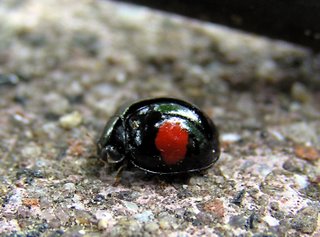
While I was trying to photograph the bug, a pigeon approached me. It was a very demanding pigeon.
"Got any food?" it asked, without even saying Excuse me first.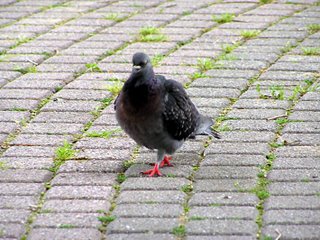
"No," I said.
"Bugger you, then!" said the pigeon, and stomped off.
And that was the end of the conversation. Not exactly a bird story, sorry, but typical of pigeons.
The wisteria at the little park had grown a lot since I saw it last, but was still not flowering. Maybe next week.
Posted by
Badaunt
at
8:19 pm
12
comments
![]()
Labels: Birds
Monday, May 08, 2006
Inconsiderate
There's a new full-time teacher at one of the places I work. He is replacing a WONDERFUL teacher who has now left, and I miss her terribly. That place has become less sane, suddenly, up on the top floor where all the full-timers reside.
There aren't many foreign teachers there, and I haven't met the new guy formally. I have only met him in passing. I spotted him on campus as I was leaving last week, and passed by, smiling and saying hello. I pretended to be in a hurry and did not stop. I'd heard too much about him that isn't very flattering.
However, I suspect he is the person who uses my last classroom on Mondays before I do. He does not wipe the board clean after using it. He sort of swipes at it, and leaves bits of words all over the place. The board is a mess when I go in. The reason I think it's him (I haven't actually checked) is that the words are all in English, and I have never seen that handwriting before. To be fair, it COULD be a different teacher, but I really don't think so.
When I go into this classroom the first thing I do is to wipe the horribly messy board clean, even if I am not going to use it. Someone is using the classroom after me, and I don't want to leave it unusable. Generally I don't notice what is on it. I am too pissed off with the inconsiderate person who left it looking like that.
But last week when I turned up I didn't do anything about it at first. A bit later I wanted to write something, turned, saw the mess, and sighed, and my students (I only have four in my last class) sympathized and tut-tutted as I wiped it clean. As I was wiping, I spotted two words that had been left intact. The first word was this:
embarrased
I stopped when I got to it, and stepped back.
"Doesn't embarrassed have two esses?" I wondered, and saw that one of my students was already looking it up in her dictionary to find out what it meant.
"Yes," she said.
"Bad, BAD teacher!" I said, and went back to wiping. The students laughed.
Then I got to the next intact word:
exstacy
I paused, thought, and then wiped it clean, fast. I didn't even want to THINK about what that guy had been teaching in his class, never mind the fact that of the two words left intact on the board, both were spelt wrongly.
Is our new teacher an ecstatic, embarrassed, dirty old man who can't spell?
WHAT IS THIS MAN EVEN DOING IN A LANGUAGE TEACHING CLASSROOM?
Posted by
Badaunt
at
9:49 pm
4
comments
![]()
Sunday, May 07, 2006
Thief
It rained very heavily today, for hours and hours. This afternoon I had to go out for a while, and when I came back the rain had almost stopped. I parked my bicycle, and went out to the road to see if the rose had survived the rain.
I guess it did. Remember I said passers-by liked my roses? Well, some passer-by liked it so much he or she rescued it from the rain. No doubt it is doing very well, in a vase inside the thief's house.
There are more buds starting to open, higher up, out of reach.
Posted by
Badaunt
at
4:34 pm
2
comments
![]()
Saturday, May 06, 2006
Rose
Today was the last fine day we'll have for a while, according to the weather forecast. It is going to be cloudy and rainy all week. It had already clouded over in the afternoon, and was windy, too. We also had another bout of kousa, the yellow dust from the Gobi desert. Apparently we had that yesterday, too, and going out for a bicycle ride probably wasn't such a good idea. I am still coughing from this cold, or perhaps it isn't a cold. Perhaps it is all caused by the kousa.
But today we went for a ride, too, to do some shopping, so I wore a mask. I also wore sunglasses, and looked as though I was going to either rob a bank or perform surgery in glaring light. The mask was a little too large and kept slipping, so I had to hold it on with my hand. I'll need to get some smaller ones if this dust business keeps up.
When we got home we noticed that our rose has produced its first bloom. I took a few photos but didn't get them quite right, and then the light was gone. The focus isn't perfect, but never mind. You get the idea.
These roses don't just look good, they are scented as well. When the plant is in full bloom it has huge clusters of deep red flowers that stop passers-by in their tracks, sometimes literally, because it is a very thorny rose and has a tendency to grab and not let go if you get too close. And it is easy to get too close, because it has escaped over the wall to get to the sun, and that is also where it blooms. When I want to see my roses I have to leave the house and go out on the road.
Maybe this year I'll remember to prune it.
Posted by
Badaunt
at
11:24 pm
2
comments
![]()
Friday, May 05, 2006
Children's Day
For the last few days I've had a cold, or else the one I had before has come back. This is extremely annoying, since I wanted to get a lot done over these few days we have off, and I'm not getting very far. I have managed some non-thinking-type paperwork, though, after spending a lot of time on the new computer getting it all set up. Everything seems to be working now, more or less. I have printed out all my class rolls, sorted out my email woes (I ended up sticking with Eudora as I discovered I am addicted to reading via the spacebar, and got irritated with anything else), sorted out my bookmarks (more or less), and discovered that my blog looks entirely different (and not very good) on a good screen. My photographs look better on a good screen, though, so that makes up for it a bit. I also bought a new keyboard yesterday, and typing has become a happy event again. Clickity clickity clack.
I am not going to change my blog appearance, though. I do not have enough energy. I had no appetite today and was not feeling good at all, so in preparation for breakfast went for a very slow bicycle ride around the neighbourhood, armed with my camera. I thought that might make me feel better, and it did, a little, or at least I forgot that I wasn't hungry and was able to eat breakfast after that.
It was a beautiful day, and today is Children's Day. I hoped to get some pictures of carp streamers, which are generally very photogenic.
(Writing about carp reminds me of the children's story I read to some students once. I held the book so they could see the pictures, and was reading upside down. I managed to read pretty smoothly upside down except when the word carp appeared, and every time that happened I said, instead, crap. Fortunately none of the students knew what it meant, so my hasty self-corrections went unremarked.)
Most of the pictures I took today, however, ended up being pictures of people's washing. There were hardly any carp streamers around. I only spotted two or three places with them up. I'm sure there are usually more, and I was determined to get pictures of SOMETHING flapping in the breeze.
This first picture combines the carp streamers AND washing.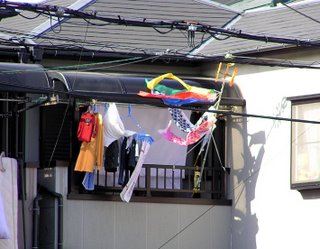
I felt a bit naughty, taking pictures of people's washing, especially when, just as I was aiming at a particularly picturesque old lady bra, the old lady in question suddenly opened her balcony door and came out to bring in her washing. I quickly swiveled around and took a picture of the street, instead.
I didn't notice until after I'd downloaded the pictures to the computer how many of them were also pictures of an incredible jumble of power lines, cable lines, and who knows what else lines. I've been here so long I don't see them any more. 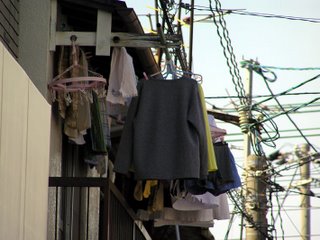
If power lines really are bad for our health we're all in trouble.
Here are some more carp, which had become all tangled up in the power lines.
In this next one you can see the washing machine is on the balcony as well as the washing. Many houses and apartments don't have space for a washing machine, so putting them out on the balcony is standard practice.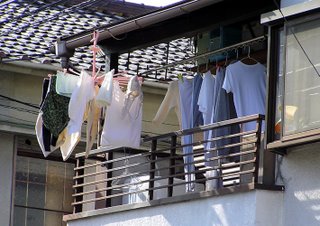
It was a good day for airing futons, although I have to admit that I am never quite sure how hygienic it is to hang them out like this. It is good to air them, of course, but when they hang against the outside of the balcony I suspect the futons are cleaning the balcony.
The other day some colleagues who live in apartments were telling me of the difficulty of cleaning their balconies.
"I scrub the balcony floor and walls and the water turns black," said one, horrified. "And that's just a week after I did it last time. What is in the AIR here?"
I told her she should air her futons more often. That would keep the balcony clean.
Finally, I have some more mystery flowers for identification. These are trees, and they are in flower now. Some are pink, and some are white. I don't know what they are, but they are all lovely.

And that is all I have for you today.
Posted by
Badaunt
at
11:17 pm
6
comments
![]()
Thursday, May 04, 2006
New tricks
I have a new computer! A new old computer, actually, but certainly newer than my old one. I got lucky, and it was given to me. Yes, it was FREE! We have some wonderful friends who thought of me when they heard someone was getting rid of their old computer, and were going to ... throw it out? Or at least were prepared to give it away providing we paid the delivery fee, which, naturally, we did.
My new computer is a flat screen desk lamp type iMac, like this one. It's LOVELY, except that it came with a Japanese keyboard and some of the keys are in the wrong place. The letters are in the right place, but if you notice that I am not using quote marks much, that is why. They have been moved, and I am avoiding using them so I can type at my usual speed.
Today I am meeting some friends for lunch, in Shinsaibashi, so perhaps I will find time to pop into the Apple Store and get an English keyboard.
I have not got OS9 up and bootable yet (and do not know why, although I can use Classic) and have not figured out how to import my bookmarks. I am gradually organizing OSX, but I imagine it will take a while. I have to say that I MUCH prefer OS9. I do not care that OSX is prettier and is supposed to be more wonderful and never crash and all the rest of it. It just does not feel as friendly. It feels as though all the important stuff is hidden from me. I liked being able to customize how things looked, and knowing what to do when something did not work the way I wanted it to. I liked being able to uninstall things easily and completely, and how troubleshooting was so easy. I liked it that I did not have to worry about security, because viruses for OS9 were so rare. OSX is not as secure, and I do not know what is going on, so that if I did get a virus I probably would just think it was some weird OSX thing. I very rarely had crashes with OS9, and in all the years I was using it on my little laptop it never gave me any major trouble. I do not want to learn a new system.
I hate it that the book I bought that is supposed to teach me how to use OSX is six centimetres thick. I would prefer to just use my try-this-and-see-what-happens method, as I did with OS9. I am being careful with this method, though. On the laptop, when I first installed OSX on a separate partition (where it ran like a slug), I tried something to see what would happen and it responded with a hard crash from which OSX refused to reboot. I had to reinstall everything. It was terrifying, although nothing was lost in the end. (I later had a nerdy Mac person tell me solemnly that it was impossible to install OSX on a partition. Perhaps the computer had just noticed.)
I guess all this just means I do not like learning new tricks. I have turned into the proverbial old ... bitch. However, I am an old bitch with a wagging tail, and my tongue is hanging out. This is all terribly exciting, and I am not really complaining. (How can I complain? This machine is beautiful!) But I am missing my bookmarks and my email, and missing the familiarity of a system I have been using for so many years.
I was using a very old version of Eudora, which I loved. Not being able to name filters was a drawback, but one I could live with. Any recommendations for a replacement? I do not like the feel of Mail very much, but should I persist? I heard (vaguely) not so good things about the later incarnations of Eudora.
If you do not hear from me for a while, it will be because I am figuring out how to use my lovely new computer and have probably crashed it or lost all my files or something. Also, once today's socializing is out of the way, I will be spending the rest of my days off trying to set up my work system, and creating files for all my new classes.
And, despite all the tiresomeness of having to learn new tricks, I am LOVING the beautiful clear screen, and loving being able to play CDs and DVDs (in my old computer the CD/DVD drive had stopped working), and loving being able to adjust the position of the screen with a touch of my finger. I am only four years out of date, now, and I am feeling so MODERN.
Posted by
Badaunt
at
9:46 am
2
comments
![]()
Monday, May 01, 2006
Sanity
Today I had ANOTHER two new students in my mostly-foreign-students class. This was the fourth week, and they're still joining. WHY? I started out with only a few students, and it is now my biggest class at that university.
It's a good thing I chose a good textbook for them this year. This is not always a given, especially with a text I have never used before and students whose level I can't be sure of before the first class. But luckily the students are mostly very low level, as is the book, and luckily the publishers contrived to make the text tapes funny. It is a very low-level text, but even the "What's your name?" conversations are funny, or at least dramatic. Even when they did the "My name is..." and "Are you a ....?" bit, they did one conversation with an apparently famous woman asking, arrogantly, "ARE YOU A JOURNALIST?" and the man saying, "Er... yes, I am," in such tones that the class erupted in laughter. It WAS funny, and I was grateful. Usually, beginner language books are childish and plodding. This one is neither. It is an adult book, which is rare. A child would not understand why that was amusing.
One of the hardest things about learning a new language is that it is hard not to sound childish at the beginning. My beginner students are not sounding stupid. They are having a ball pretending to be arrogant famous people and apprehensive journalists. They are having FUN. And even the higher level (comparatively) Japanese students in the class are enjoying all the 'repeat after me' exercises I am doing. Their pronunciation is horrible, and they know it. So even though the language is easy for them, they are at least learning something.
I wish the class wasn't QUITE so large, though.
In one of my other classes at today's university there is a mature student who was in one of my classes a couple of years ago. At that time she behaved in a mentally unbalanced way, so much so that I was afraid she would turn up one day with a knife. I was seriously worried about this woman. She frightened the other students (and me) with a door-rattling and then fist-shaking incident which led me to consult someone in authority. It seemed to me that she hated my class and wanted us all dead. After he talked to her she dropped out of my class (and I had to fail her because she didn't withdraw officially), and when she saw me in the corridors after that she'd walk sideways like a crab, with her face turned to the wall, rather than acknowledge my existence. The whole thing was entirely bizarre and worrying.
The person in authority who talked to her told me at the time not to worry, it was not me, she was a 'difficult person,' but I never entirely believed it. She was in my colleague's class the same year, where she behaved perfectly normally. Naturally, this made me fairly sure that I was the problem, perhaps for reasons over which I had no control.
However, this year she has turned up in my class again and is behaving entirely like a normal person. This is puzzling, but an enormous relief. She is treating me like a friendly human being she can relate to, and in fact I probably made this easier for her by not realizing she was the same person at first. It just seemed too unlikely, although she looked familiar and I thought I knew her name. (She only came to about five classes last time.) But I checked, and it is definitely the same woman. This time she is asking questions and taking correction and help without getting upset, which was not the case before - previously when I corrected her or tried to help her she would rip her paper up violently and twist away from me, making frightening little panting noises. But now it is as if that previous madness never happened. She is a new woman.
So perhaps it was not me. It was just her madness, and now she is over it. She is now an easy student to have in the class, and the other students seem to like her. I am, of course, walking on eggshells, but they are invisible eggshells. I am not letting it show. I am treating it as a fresh start. (The only thing I can do, really.) Come to think of it, I didn't see her around at all last year, which makes me wonder if she took a year off and sorted out whatever was wrong. If so, good for her. It worked.
It was almost hot today. The temperature suddenly shot up. At lunchtime I ate with a colleague out in the little park beside the university, under the wisteria trellis. A couple of weeks ago the wisteria was just bare bones. Then the leaves started sprouting, and it is hard to believe that within the next couple of weeks there will be cascades of flowers. But today as we were sitting under the trellis, and not getting quite enough shade (because there aren't enough leaves yet), I noticed the pattern the trellis made, and pulled out my camera. I thought it looked rather wonderful from my angle. I couldn't see the leaves at all, because they were above the trellis, but I could see the shadows of the leaves. (As usual, click to enlarge.)
From a slightly different angle I got a slightly different effect. In this one you can see the trunk of the wisteria vine, twisting up through the trellis. The colours came out different, too, probably because of the different amount of light coming through from different angles.
Next week or the week after, if it isn't raining, I will photograph the flowers.
After I got home I photographed our peony. A friend gave this to me last year, and it didn't bloom. This year it bloomed and surprised me. I had forgotten about it, and wondered what it was at first. It is lovely.
You can see the starflowers (thank you Cheryl for naming them!) underneath it, and get an idea of how small they are. I have an early start tomorrow, but after that five days off. There are three public holidays in a row. and then the weekend. This is known here as Golden Week, and many employers give their employees the entire week off. None of mine do, worse luck. Today and tomorrow are normal working days for me.
I have an early start tomorrow, but after that five days off. There are three public holidays in a row. and then the weekend. This is known here as Golden Week, and many employers give their employees the entire week off. None of mine do, worse luck. Today and tomorrow are normal working days for me.
After Golden Week we have ten straight weeks with no public holidays at all. There is something skewed about this way of doing things, but at the moment I am not complaining. I have too much paperwork to catch up with, and five days off right now feels just right. But be prepared for a bout of grumbling in a few weeks, when the rainy season starts, the air conditioning hasn't been turned on yet, and everyone is tired and pissed off. I will make up for it then by moaning about absolutely everything.
For now, however, I have chosen at least one good textbook, a mad student has become sane, the weather is beautiful, and everything is fine and funny.
Posted by
Badaunt
at
10:17 pm
2
comments
![]()




